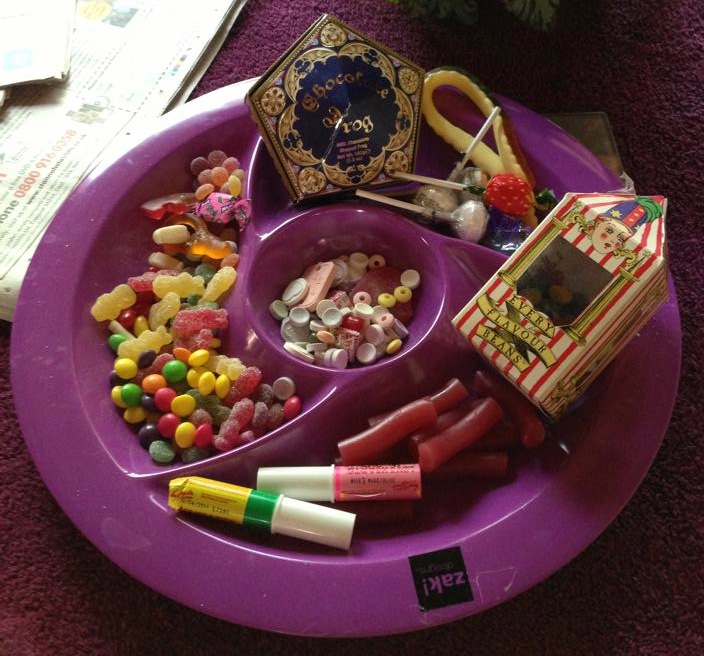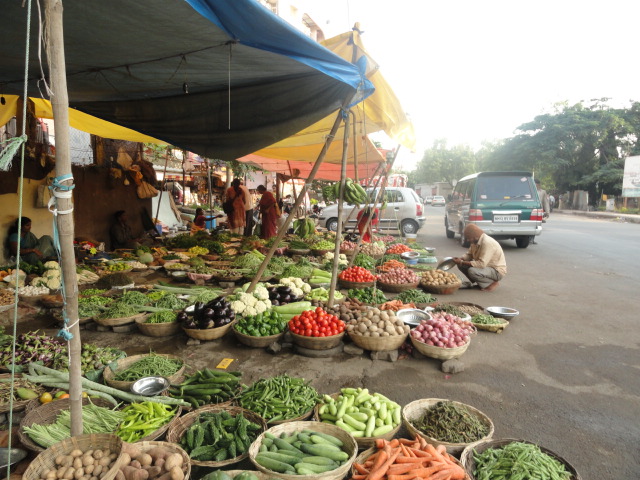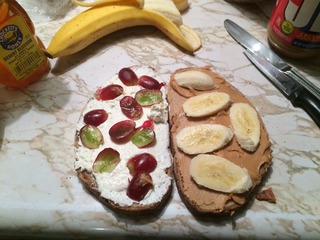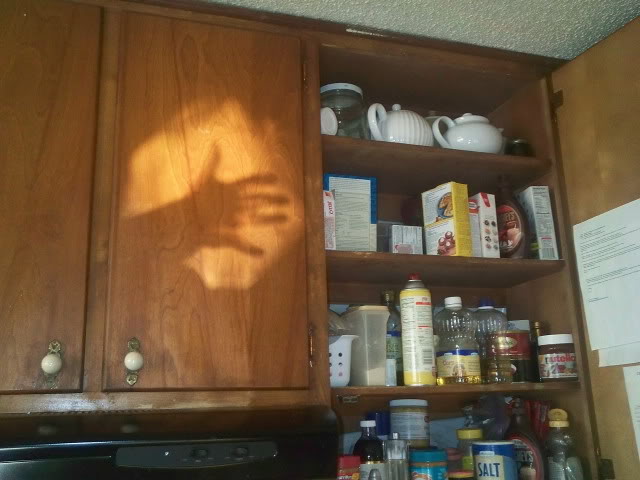I had brought a ten-dollar bill (no wallet) I told her we'd have about six dollars left and she could get whatever she wanted with it—she wanted a pomegranate or three artichokes (neither of which we had enough money left for) I told her we could come back later with my wallet and get them or get them now skip the milk and come back later for the milk to finish our cake. She said come back later for the artichokes. When we were at the checkout I said why don't you just get a candy bar or something for the walk home she said no thanks. A mom behind me in line was shocked at the idea of a kid not wanting candy if offered said she never heard of such a thing.—Christine Macdonald
SandraDodd.com/eating/sweets
photo by Jihong Tang
Showing posts sorted by date for query eating/idea. Sort by relevance Show all posts
Showing posts sorted by date for query eating/idea. Sort by relevance Show all posts
Friday, January 23, 2026
Never heard of such a thing
Saturday, June 21, 2025
Pleasantly surprised

I was asked:
Did your kids have rules like bedtimes, no candy before dinner ... that sort of thing?
I wrote:
We didn't have those rules, but our kids went to bed every night and didn't eat candy before dinner. It seems crazy to people who believe that the only options are rules or chaos, but our children slept when they were sleepy, and ate when they were hungry (or when something smelled really good, or others were eating), and I was pleasantly surprised to learn that they were able to know what their bodies needed. I grew up by the clock, up at 6:30, eat quickly, bus stop, school, wait until lunch, eat, wait until dinner, go to bed. I had no idea that sleep and food could be separated from a schedule like that, but they can be.
photo by Sandra Dodd

Sunday, January 5, 2025
Comfortable new ideas

Lea Goin wrote:
I just realized my children turn down sweets all the time!
I've tried to maintain a candy bowl in hands reach for years. They stopped emptying it pretty much right away. Got comfortable with the idea that candy is always available if they want some.
And this past Halloween two of mine chose to skip trick or treating in favor of other activities. And one gave me back a pretty full bag to put in the family candy bowl.
—Lea Goin
photo by Rachel Kay
Wednesday, November 15, 2023
A variety of good things

Without choices, they can't make choices. Without choices they can't make good choices OR bad choices. In too many people's minds, "good" is eating what parents say when parents say (where and how and why parents say). That doesn't promote thought, self awareness, good judgment or any other good thing.
SandraDodd.com/eating/idea
photo by Sandra Dodd, in Pune, in India
Wednesday, June 21, 2023
Food and its purpose
You might have to do away with the idea of a peaceful mealtime for a few years. Maybe re-thinking meals would be the way to go.
I think it helps rather than to live by the idealized traditional model of dinner at 6:00, all at their seats, dinner conversation that could be reported to the media as an ideal mix of news of the day and philosophy, etc, to think of food and its purpose. People need to be nourished physically and it's uncomfortable to go to sleep hungry. THAT is the purpose of evening food, not the appearance of a well-organized dinner.
photo by Sandra Dodd, of one of the former Dodd babies
Monday, May 1, 2023
Everything changes
"Eating decisions"?
I picked it up and set it down just a little way from there with this response:
Choices. If ALL of that is changed to a model in which there is food, and people make choices—lots of small choices, not big "decisions"—a hundred hard problems disappear.
In one small moment, if a child can pick up a food or not; smell it or not; taste it or not; keep that bite and chew and swallow, or spit it out; take another bite or not; dip it in something or not; put another food with it or not—EVERYTHING changes.
photo by Sarah S
Sunday, July 3, 2022
Peace and love and food
Food is for health and sustenance. Eating with other people can be a social situation, ranging (on the good end) from ceremonial to obligatory to courtesy. There's no sense making it hostile or punitive.
SandraDodd.com/eating/idea
photo by Sarah S.
Tuesday, August 22, 2017
Choosing food

If children are allowed to turn foods down, they're not forced to eat, and they're given choices, they will come to choose good foods, know when they're hungry and when they're not, and actually learn to listen to their bodies and know what they need.
This is such a departure from tradition in our culture that it seems altogether wrong, at first.
photo by Sandra Dodd
of cream cheese, peanut butter and honey sandwich
with grapes and banana
__
Wednesday, December 7, 2016
Variable, thoughtful lunch

Some days lunch is medicinal—one child is sickly and could use soup or juice. One is off to a sports event, and carbohydrates are a good idea. One is sad, and would like comfort food. One is bored, and her sandwich could use a face.
Be as loose as a dancer, as variable as an actor, as thoughtful as a chessplayer, when you decide what to make for lunch sometimes!
photo by Hinano
The words are from Little meals make big memories
Monday, October 31, 2016
Like magic

Since my kids were little they could have all the Halloween candy they wanted, and since they were little that has been no problem at all, because by the time they gave away what they didn't like and traded for favorites, and saved it and shared it with kids who came over for the next few weeks, there was still candy left.
We were confident that it was control, not access, that made kids eat, do and want "too much" before we ever considered unschooling. Others come to the idea the other way around—unschooling first and releasing other control-urges later.
photo by Pam Sorooshian
This is a repeat from 2013
because the photo is great
with text from 2010
because it's still true.
__
Monday, June 22, 2015
Pleasantly surprised

I was asked:
Did your kids have rules like bedtimes, no candy before dinner ... that sort of thing?
I wrote:
We didn't have those rules, but our kids went to bed every night and didn't eat candy before dinner. It seems crazy to people who believe that the only options are rules or chaos, but our children slept when they were sleepy, and ate when they were hungry (or when something smelled really good, or others were eating), and I was pleasantly surprised to learn that they were able to know what their bodies needed. I grew up by the clock, up at 6:30, eat quickly, bus stop, school, wait until lunch, eat, wait until dinner, go to bed. I had no idea that sleep and food could be separated from a schedule like that, but they can be.
photo by Sandra Dodd

Friday, October 24, 2014
Little meals make big memories
Some days lunch is medicinal—one child is sickly and could use soup or juice. One is off to a sports event, and carbohydrates are a good idea. One is sad, and would like comfort food. One is bored, and her sandwich could use a face.
Be as loose as a dancer, as variable as an actor, as thoughtful as a chessplayer, when you decide what to make for lunch sometimes!

Some holidays
Advantages of Eating in Peace
photo by Sandra Dodd

Be as loose as a dancer, as variable as an actor, as thoughtful as a chessplayer, when you decide what to make for lunch sometimes!

Advantages of Eating in Peace
photo by Sandra Dodd

Sunday, June 22, 2014
The big idea
photo by Sandra Dodd
__
Thursday, October 31, 2013
Still candy left

Since my kids were little they could have all the Halloween candy they wanted, and since they were little that has been no problem at all, because by the time they gave away what they didn't like and traded for favorites, and saved it and shared it with kids who came over for the next few weeks, there was still candy left.
We were confident that it was control, not access, that made kids eat, do and want "too much" before we ever considered unschooling. Others come to the idea the other way around—unschooling first and releasing other control-urges later.
photo by Pam Sorooshian

Tuesday, April 9, 2013
Children reach for food
Because of La Leche League and natural weaning, and the idea that children will reach for food when they want some, so you don't have to schedule and spoon it into them, it was easy for me to see the smallest seedling-root beginnings of how our culture creates the eating disorders they bemoan. Letting kids decide what THEY think is good and bad, instead of labelling things good and bad in advance for them, allows a child to think spinach is wonderful but donuts are kinda yucky.
SandraDodd.com/foodproblems
photo by Sandra Dodd

 |
Without choices, they can't make choices. Without choices they can't make good choices OR bad choices. In too many people's minds, "good" is eating what parents say when parents say (where and how and why parents say). That doesn't promote thought, self awareness, good judgment or any other good thing.
Food is for health and sustenance. Eating with other people can be a social situation, ranging (on the good end) from ceremonial to obligatory to courtesy. There's no sense making it hostile or punitive.
photo by Sandra Dodd

Friday, June 1, 2012
Food and its purpose
You might have to do away with the idea of a peaceful mealtime for a few years. Maybe re-thinking meals would be the way to go.
I think it helps rather than to live by the idealized traditional model of dinner at 6:00, all at their seats, dinner conversation that could be reported to the media as an ideal mix of news of the day and philosophy, etc, to think of food and its purpose. People need to be nourished physically and it's uncomfortable to go to sleep hungry. THAT is the purpose of evening food, not the appearance of a well-organized dinner.
photo by Sandra Dodd, of one of the former Dodd babies

Tuesday, December 7, 2010
Leftover Halloween Candy
Since my kids were little they could have all the Halloween candy they wanted, and since they were little that has been no problem at all, because by the time they gave away what they didn't like and traded for favorites, and saved it and shared it with kids who came over for the next few weeks, there was still candy left. I have very often found the sorting boxes (a Xerox box lid or cardboard Coke flat) months later, and one year when it was nearly Halloween again, Kirby threw out the last of the candy from the year before. (Ditto for Christmas and Easter candy, some years.)
We were confident that it was control, not access, that made kids eat, do and want "too much" before we ever considered unschooling. Others come to the idea the other way around—unschooling first and releasing other control-urges later.

SandraDodd.com/eating/halloween
photo by Sandra Dodd, of an autumn tree in the back yard
We were confident that it was control, not access, that made kids eat, do and want "too much" before we ever considered unschooling. Others come to the idea the other way around—unschooling first and releasing other control-urges later.

SandraDodd.com/eating/halloween
photo by Sandra Dodd, of an autumn tree in the back yard
Thursday, December 2, 2010
Food Freedoms

Because of La Leche League and natural weaning, and the idea that children will reach for food when they want some, so you don't have to schedule and spoon it into them, it was easy for me to see the smallest seedling-root beginnings of how our culture creates the eating disorders they bemoan. Letting kids decide what THEY think is good and bad, instead of labelling things good and bad in advance for them, allows a child to think spinach is wonderful but donuts are kinda yucky.
Without choices, they can't make choices. Without choices they can't make good choices OR bad choices. In too many people's minds, "good" is eating what parents say when parents say (where and how and why parents say). That doesn't promote thought, self awareness, good judgment or any other good thing.
Image by Holly and Sandra
Subscribe to:
Comments (Atom)




